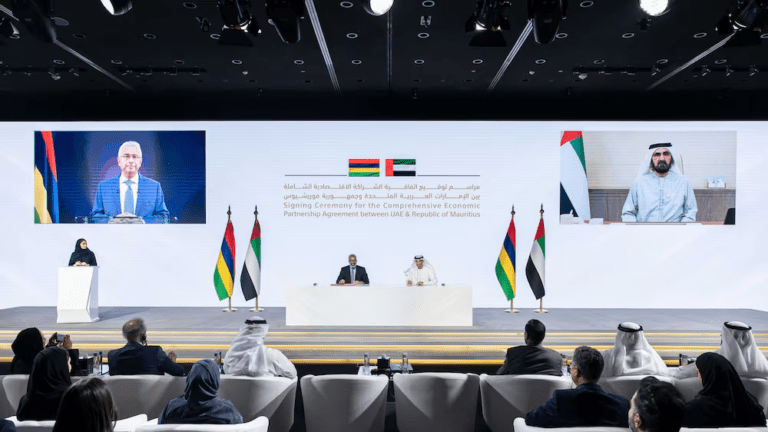The UAE has signed a Comprehensive Economic Partnership Agreement (CEPA) with Mauritius, marking its first such pact with an African nation. This agreement aims to boost economic growth by removing tariffs and increasing market access.
Finalized in December, the CEPA will see Mauritius eliminate 99% of tariffs on UAE imports, while the UAE will remove 97% of its fees. Officials anticipate a 0.96% boost to the UAE’s GDP and a 1% increase for Mauritius by 2030.
Sheikh Mohammed bin Rashid, Vice President and Ruler of Dubai, highlighted the shared vision to enhance bilateral relations and economic opportunities. Trade and investment ties are deepening, with non-oil trade between the two nations rising by 82.5% to $76 million from January to April. In 2023, trade reached $170.4 million, up 14.5% from the previous year.
Dr. Thani Al Zeyoudi, UAE Minister of State for Foreign Trade, projects that by eliminating tariffs and trade barriers, bilateral non-oil trade could surpass $500 million within five years. The UAE, the eighth-largest investor in Mauritius with $13.2 billion in various sectors, aims to further strengthen this relationship.
The CEPA is expected to create jobs, enhance supply chains, and streamline market access for businesses from both countries. Mauritius’ Prime Minister, Pravind Kumar Jugnauth, emphasized the broader benefits of fostering a partnership that will benefit the Gulf region and Africa. He praised the UAE’s role in facilitating global trade and investment.
The UAE is pursuing a target of Dh4 trillion ($1.1 trillion) in non-oil foreign trade and aims to increase exports to Dh800 billion by 2031. In 2023, the country’s non-oil trade hit a record $701 billion, a 12.6% annual increase. The UAE plans to sign 26 CEPAs, with agreements already in place with India, Turkey, Israel, Indonesia, Cambodia, and Georgia.
Suhail Al Mazrouei, UAE Minister of Energy and Infrastructure, noted that the agreement would bolster energy and infrastructure investments. Mauritius aims to increase renewable energy to 60% of its electricity mix by 2030, focusing on solar, wind, biomass, hydro, and waste-to-energy sources.
Dr. Sultan Al Jaber, UAE Minister of Industry and Advanced Technology, highlighted new opportunities for the UAE’s private sector, praising the promising Mauritian economy, which saw an 8.5% GDP growth in 2022.
Abdulla bin Touq, UAE Minister of Economy, stressed that the CEPA will enhance trade and investment flows, creating significant opportunities in logistics, manufacturing, tourism, and financial services.
The CEPA is set to bring substantial economic benefits to both nations, reinforcing their strategic partnership and fostering regional stability and growth.


